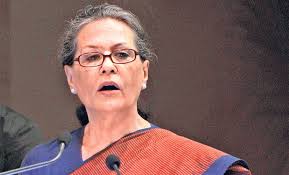 New York, Mar 21: A US court has asked Congress Party president Sonia Gandhi to provide a copy of her passport to show that she was not in the US between Sep 2 and Sep 9 last year.
New York, Mar 21: A US court has asked Congress Party president Sonia Gandhi to provide a copy of her passport to show that she was not in the US between Sep 2 and Sep 9 last year.
Gandhi had filed a motion in a federal court in Brooklyn, New York, seeking dismissal of a human rights violation case against her relating to the 1984 anti-Sikh riots, asserting she had not been served the summons as she was not in the US during that time.
However, holding that Sonia Gandhi's January 10 declaration is insufficient to prove her absence from US, Judge Brian M. Cogan of Brooklyn Court Thursday asked her to "provide a copy of her passport, showing her most recent entry and exit stamps into and out of the United States."
"This would appear to obviate both the need for any documents from the hospital-resolving defendant's medical privacy concerns - and the need to rely upon a third party government agency like Customs and Border Protection", the order states.
"Whatever form this evidence takes, defendant must provide it by April 7, 2014" Cogan ordered.
In his March 20 order the Judge said "the court cannot find that a sufficient showing of non-presence has been made based on the affirmation without plaintiffs having received some discovery to confirm it".
"The defendant must provide some documentary evidence to corroborate her otherwise unsupported declaration stating that she was not in the United States at the time of service", he said.
The 1984 human rights violation case against Gandhi hinges on the issue whether she was served on Sep 9 as claimed by Sikhs for Justice (SFJ) or she was not present in the US during that time as per her claim.
SFJ claims that on Sep 9, it had served the summons and complaint on the hospital and security staff at Memorial Sloan-Kettering Cancer Centre in New York where Sonia Gandhi was believed to be undergoing medical treatment.
The Brooklyn court had in Sep 2013 issued summons against Gandhi on the complaint filed by SFJ and some victims of anti-Sikh violence in India in November 1984.
The group has sought compensatory and punitive damages against Gandhi for her alleged role in shielding and protecting Congress party leaders including Kamal Nath, Sajjan Kumar and Jagdish Tytler from prosecution for their alleged role in the 1984 violence





Comments
Add new comment